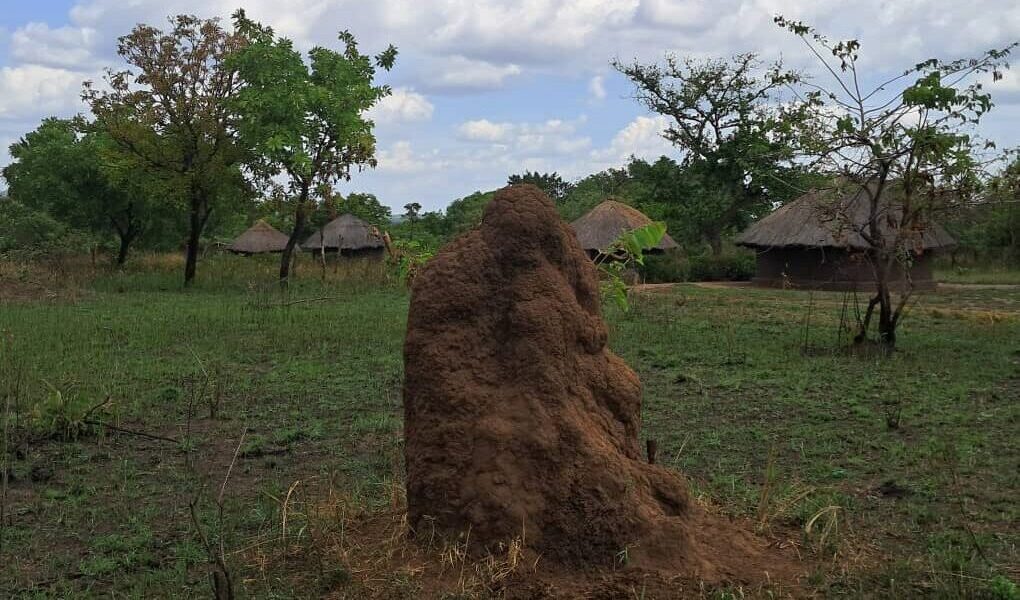During my recent visit to Gulu, in Northern Uganda, I was struck by the large, towering mounds built by termites. These social insects, often referred to as “white ants”, live in colonies and typically range in size from one-eighth of an inch to one inch long. Despite their small size, together they construct massive structures, sometimes over 8 meters tall, even taller than houses built by humans. These mounds are formed using a mixture of soil, saliva, and feces. Saliva of such a small insect? One may not make it, but together they do. Comparing insects to human beings might seem far-fetched. Yet, as a human being, I found the termites’ collaborative work deeply inspiring. Observing the outcome of their work helped me appreciate the strength and meaning of collective effort; how even those who may seem weak or face immense hardship can achieve great things when they work together. This insight came at just the right moment, as I was visiting Community-Based Sociotherapy (CBS) groups in Patiko Sub-county, Gulu.
Gulu has endured the devastating effects of a prolonged war. What people face in the aftermath includes significant psychological and social challenges, including hopelessness, substance abuse, gender-based violence, and suicide. Amid these difficulties, CBS groups provide a space for people to reconnect and begin healing.
A CBS group participant shared as her experience:
“I thought of ending my life before joining this group. I lost my husband during the war in 1996. I started to have sleepless nights. My husband would appear in my dreams, always inviting me to the grave. When I joined the group, the members listened to me. I began to enjoy my nights again, no more sleepless nights.” – Female CBS participant, Gulu, Uganda.
As this quote illustrates, CBS groups offer participants a way to process traumatic experiences. However, CBS does not focus solely on trauma. While remaining mindful of long-term reactions to traumatic experiences, such as fear, anger, isolation, hopelessness, and difficulty regulating emotions, the focus of CBS is primarily on people’s daily life. The group becomes a therapeutic environment, offering safety, containment, and mutual support.
CBS is rooted in the therapeutic community model that was first developed in psychiatric settings during the mid-20th century. Until the early 1900s, mental health treatment often excluded patients from normal social interaction. In the 1930s, practitioners began recognizing that socially isolating individuals was counterproductive to their recovery. This led to a new approach, one centered on community living in a supportive, therapeutic setting. Sociotherapy emerged from this shift towards the end of the Second World as a form of “milieu therapy”, emphasizing the relearning of social roles, interpersonal behavior, and the power of togetherness.
Since 2005, Community-Based Sociotherapy has evolved to address relational and collective trauma caused by war, genocide, forced migration, disease, and natural disasters. CBS acknowledges that such experiences not only affect individuals but also social relationships and community cohesion. By working in groups, people can build trust, create safe spaces for dialogue, and form peer support networks.
CBS groups typically consist of 10 to 15 people who meet weekly for three hours over 15 weeks. Meetings take place in locations chosen by participants as safe, such as schools, churches, offices, private homes, or even under a tree or in open fields. Each group is facilitated by two trained sociotherapists, or CBS facilitators, selected from the same community as group participants. These sociotherapists guide participants through six phases: safety, trust, care, respect, new life orientation, and memory. Throughout the CBS process, seven core principles are applied: interest, equality, democracy, participation, responsibility, learning-by-doing, and here-and-now.
When termites work together, they can achieve more. In Sociotherapy groups, participants also worktogether, they rely on the shared wisdom, empathy, and encouragement of others to do so. A supportive environment of trust, care and shared responsibility helps people feel stronger and recover from even the most difficult experiences. As the Rwandan proverb says, ‘Abishyize hamwe, batwara inzovu ku mashyi’—those who join together can carry even an elephant with their bare hands.”

